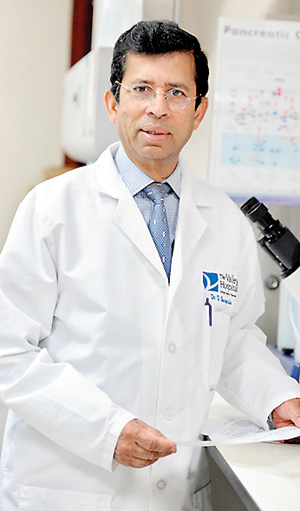Sunday Times 2
Lankan Physician in Research Team to detect early-stage cancer
View(s):NEW YORK – Dr. Jiva Ganepola, Professor of Surgery at Columbia University, New York, and his team of researchers have developed a blood test that will someday help detect early-stage lung cancer when it’s most treatable.If the preliminary findings are replicated in a larger study, according to a published news report in the New Jersey Record, oncologists may have a cheaper, less invasive and more accurate test to diagnose the leading cause of cancer deaths in men and women in the United States.
 The breakthrough research focuses on identifying biomarkers – such as a certain protein in the blood – to screen for cancer at the molecular level. Dr. Ganepola, who was educated at Nalanda College and received his medical education at the prestigious Kyoto University of Japan, was quoted as saying: “It’s detected early so the chemotherapy and radiation can better target the cancer.”
The breakthrough research focuses on identifying biomarkers – such as a certain protein in the blood – to screen for cancer at the molecular level. Dr. Ganepola, who was educated at Nalanda College and received his medical education at the prestigious Kyoto University of Japan, was quoted as saying: “It’s detected early so the chemotherapy and radiation can better target the cancer.”
A director of the Center for Cancer Research and Genomic Medicine at Valley Hospital, he developed the blood test with the Wistar Institute, a private lab based in Philadelphia.
Additionally, he and other researchers are working to create a similar test to diagnose early-stage pancreatic cancer – described as one of the most lethal cancers, with only one-fifth of patients surviving for a year because the disease is typically diagnosed at the end stage.
With little change in the death rates for pancreatic and some other cancers for a generation, the pursuit of precision medicine offers hope that mortality rates might improve through better diagnostic tools and more personalised treatment strategies, according to experts, according to the news report.
The research comes at a time when US President Barack Obama has announced a $215 million plan to create a national study group of one million people who would be tracked by the National Institutes of Health to improve understanding of cancer and other diseases and develop new treatments.
A total of 140 clinical trials are under way at Valley Hospital to explore new devices to improve cardiac treatment and to discover drugs to better target heart disease, cancer and strokes. Valley was also one of two sites in the state last year to implant a pacemaker one-tenth the size of a conventional device – about the size of a vitamin – which is now going through the Food and Drug Administration’s approval process.
Meanwhile, the blood test, which would require the larger study before it could be presented to the FDA for approval, is more convenient and accurate than the low-dose CT scans that now detect cancer, according to Dr. Ganepola, who is also a lead author of the study published last month in Oncotarget, an online medical journal.
CT scans can’t confirm cancer, but they do detect nodules in the lung. About half of smokers 50 and older who undergo routine screening for lung cancer are diagnosed with nodules, but only a fraction of the nodules are malignant, Dr. Ganepola said.
Dr. Ganepola, joined Columbia, which is an academically-elitist Ivy League University, back in the early 70′s, after his stint at Kyoto University.
One of his mentors at Kyoto was the famous Professor Honjo who was the Chair of Surgery and Oncology.Professor Honjo singled out Dr. Ganepola in his keynote speech at the 100th anniversary of the Memorial Hospital. Valley Hospital, along with the University of Pennsylvania, own the patents for tests to detect Lung Cancer in the early stages. According to current statistics, about one million people will die of lung cancer.
However with this new test for lung cancer, 50% of patients will survive. Valley Hospital is also working with China and Mongolia for a vaccine for Liver Cancer.

